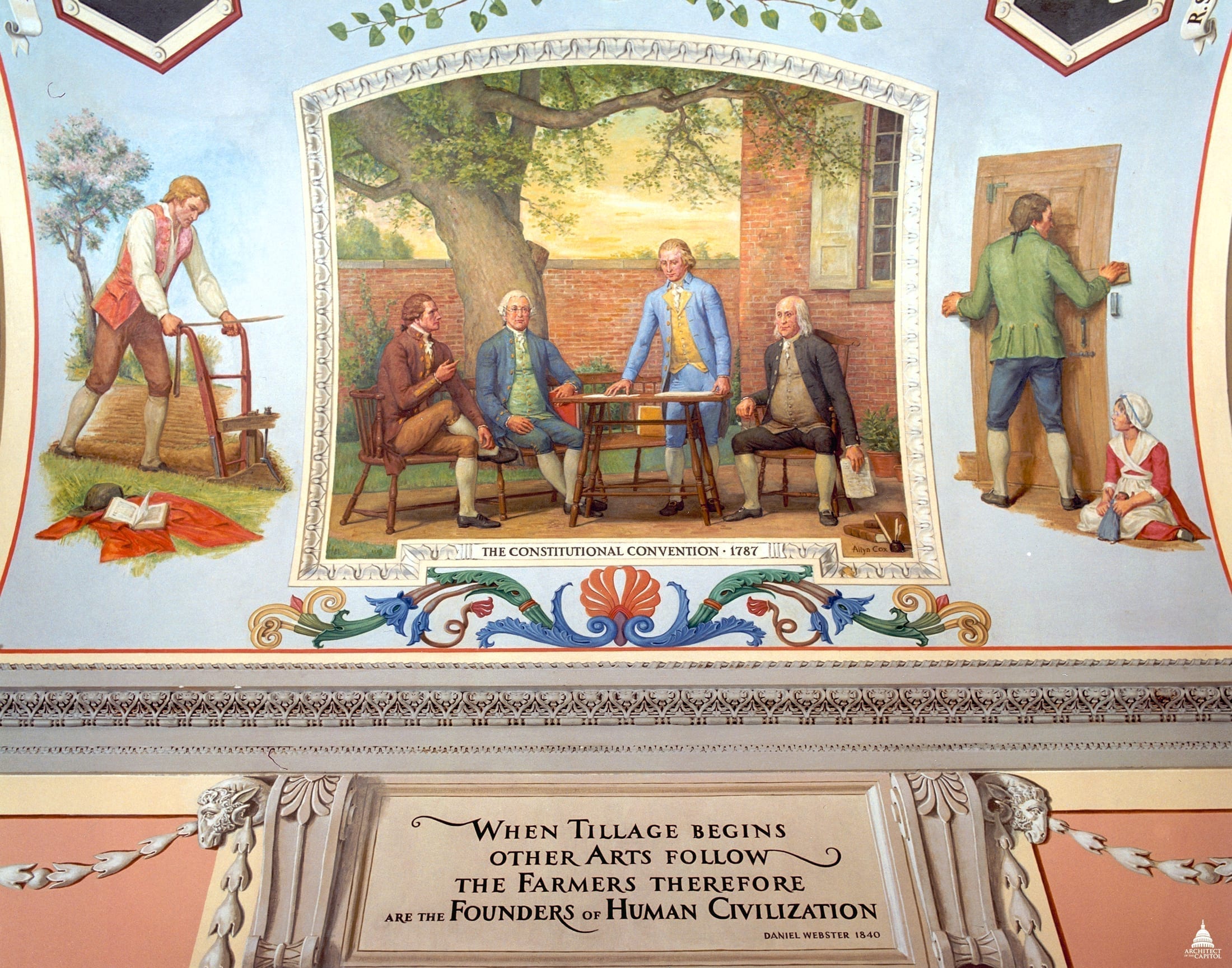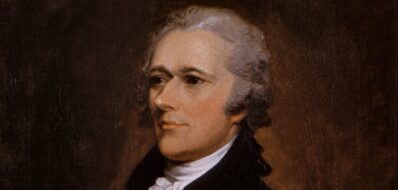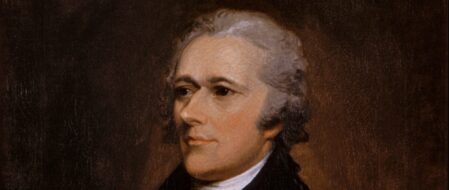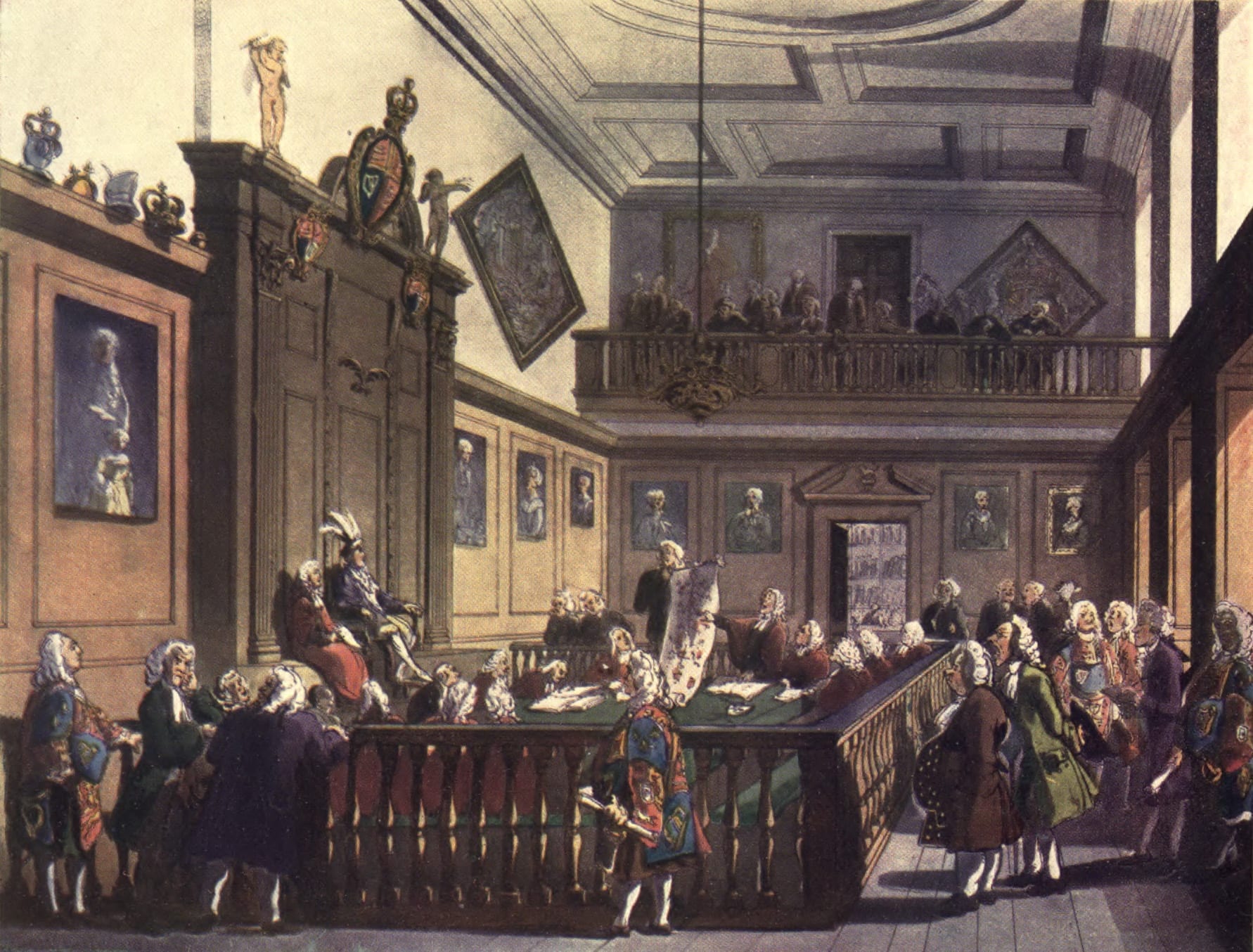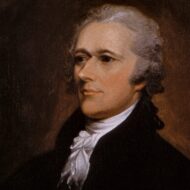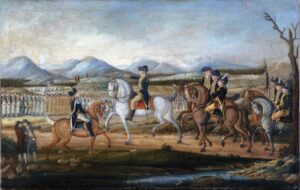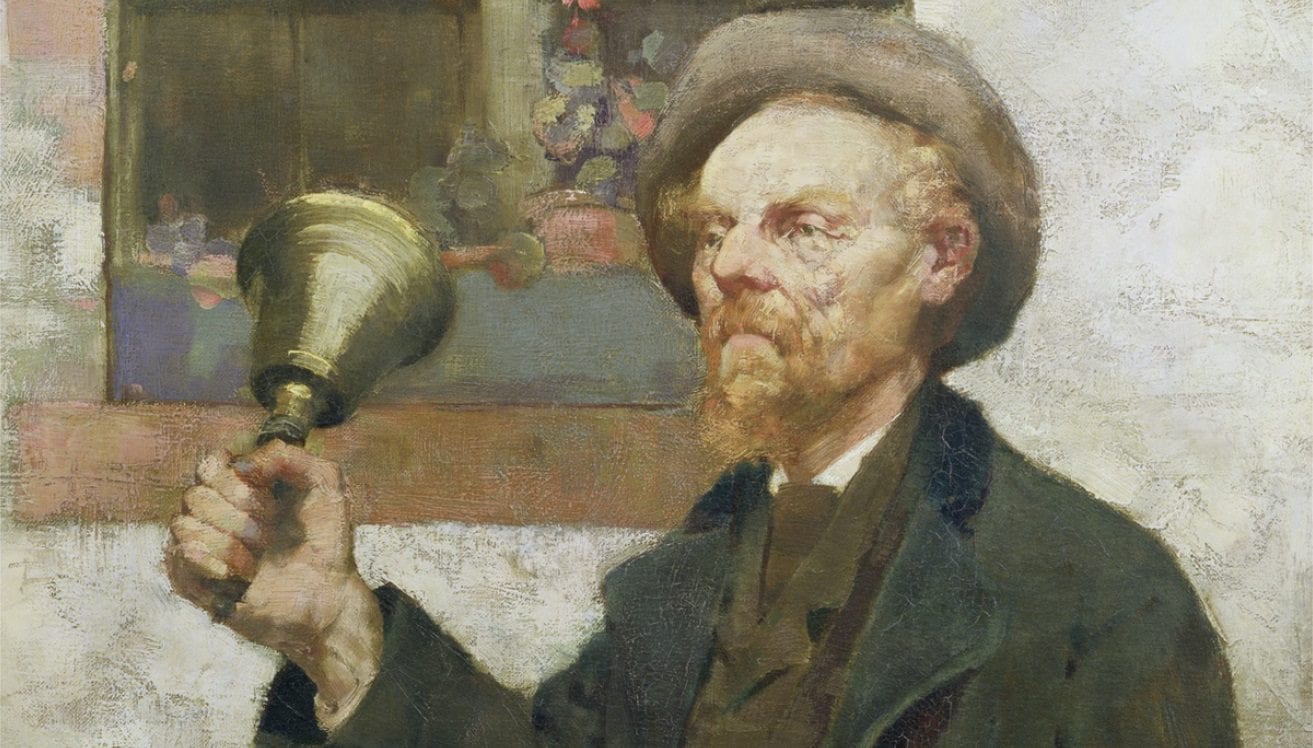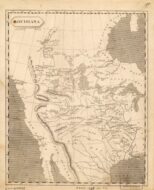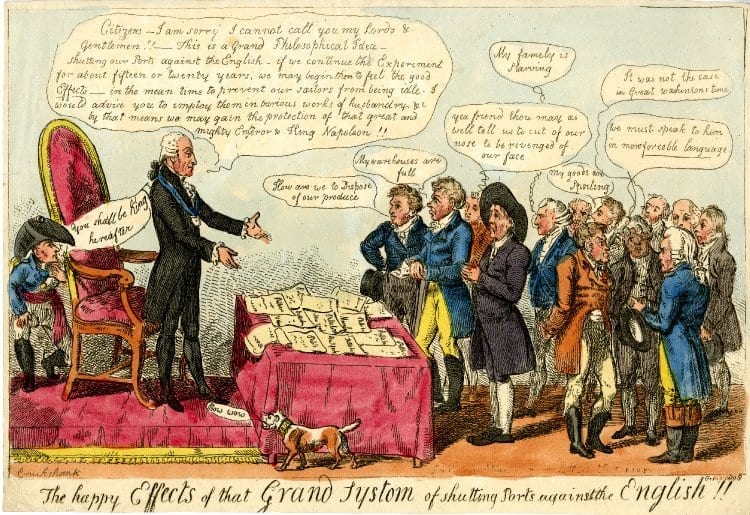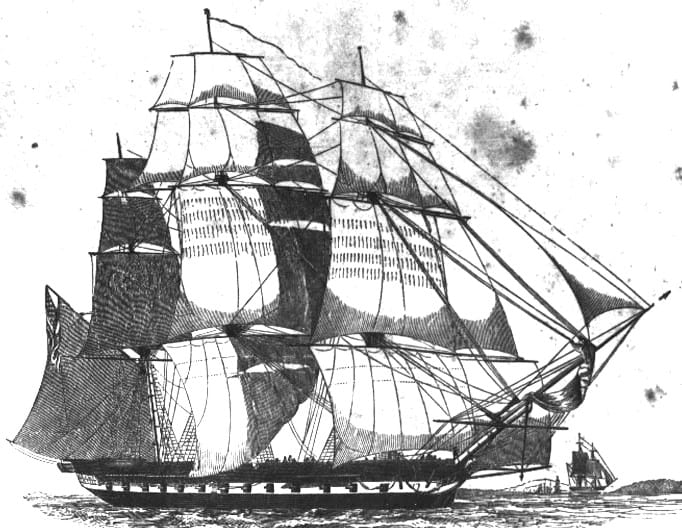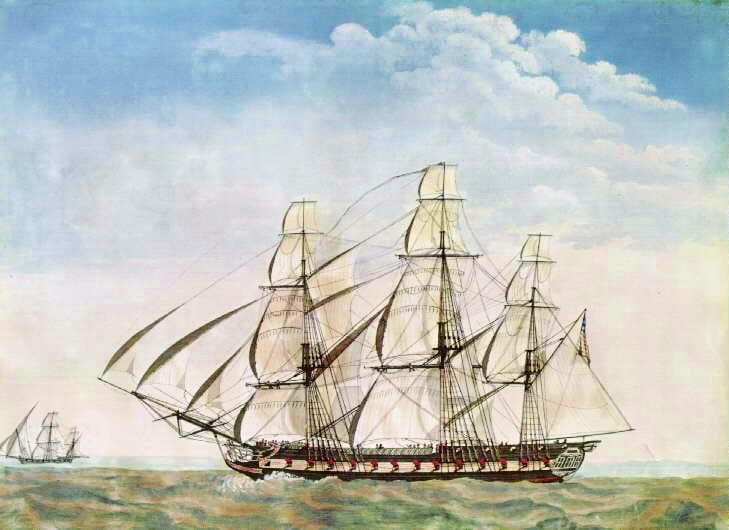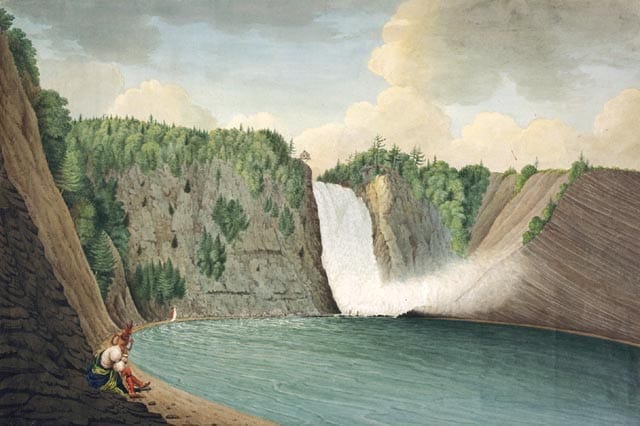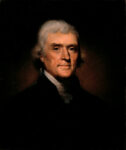
No study questions
No related resources
Introduction
In 1791, the first Congress passed an excise tax on distilled alcohol, the first tax ever levied by the national government on a domestic manufacture. Farmers in the nation’s frontier counties (who commonly turned much of their grain crop into whiskey for easier transportation to eastern markets) bore the brunt of the tax and rapidly made their dissatisfaction with the policy known. Resistance was best organized in the four western counties of Pennsylvania, whose residents held a series of public meetings to draft petitions urging their representatives to repeal the law. At the same time, these meetings adopted resolutions advising individual non-compliance with the law, framing it as an unjust imposition upon the liberties of the people.
The conflict dragged on for several years, and when their initial efforts at peaceful non-compliance failed to secure the repeal of the excise, some western Pennsylvanians adopted tactics of violent resistance to the enforcement of the law. A number of excisemen were accosted in the line of duty, tarred and feathered and (in at least one instance) tied up outside overnight in an attempt to coerce them into renouncing their commissions. When accounts of the violence reached the national government in Philadelphia, Secretary of the Treasury Alexander Hamilton (whose department was ultimately responsible for the revenues collected by the excise) prepared a report for President George Washington.
Hamilton’s report begins by describing the situation as a “disagreeable crisis” but ends by labeling the parties involved as insurgents, and their resistance as a domestic insurrection. He is frequently credited with convincing the president that matters would not be resolved apart from the use of military force, with the result that Washington issued a presidential proclamation to that effect. Meanwhile, Hamilton’s pseudonymous Tully essays were meant to turn public opinion against the rebellion and bolster public support for the president’s decision to send in the militia. (In actuality, Washington himself took command of the nearly 13,000 troops that were marched to the West in October 1794, the only time an American president has actually served as a combat commander while in office; see Frederick Kemmelmeyer’s painting of the event, Washington Reviewing the Western Army at Fort Cumberland, Maryland).
Hamilton’s essays and the marshaling of troops succeeded in quelling the rebellion without further violence. Yet the central question raised by the insurgency remained: to what extent and in what ways can citizens in a republic organize to resist laws they find unjust or immoral before becoming rebels or traitors? In the years following the incident, moderate opponents of the excise tax and other strongly national policies like it would offer opposing narratives of the insurrection in which they attempted to present the national government as oppressive.
William Findley (a Republican from Western Pennsylvania who served as a long-time member of the House of Representatives), for example, downplays the violence of the rebels and instead focuses on the government’s attempt to restrict the freedoms of speech and association of individual citizens in his Defense of the Insurgents. Such interpretations were repeated by many others over the course of John Adams’s presidency and doubtlessly helped to bolster the rise of the Jeffersonian Republicans as a substantial opposition party within national politics.
Source: “To George Washington from Alexander Hamilton, 5 August 1794,” Founders Online, National Archives, https://goo.gl/kUFNMp.
Sir,
The disagreeable crisis at which matters have lately arrived in some of the western counties of Pennsylvania, with regard to the laws laying duties on spirits distilled within the United States and on stills, seems to render proper a review of the circumstances which have attended those laws in that scene, from their commencement to the present time – and of the conduct which has hitherto been observed on the part of the government, its motives and effect; in order to a better judgement of the measures necessary to be pursued in the existing emergency.
The opposition to those laws in the four most western counties of Pennsylvania (Alleghany, Washington, Fayette and Westmoreland) commenced as early as they were known to have been passed. It has continued, with different degrees of violence, in the different counties, and at different periods. . . .
The opposition first manifested itself in the milder shape of the circulation of opinions unfavorable to the law – and calculated by the influence of public disesteem to discourage the accepting or holding of offices under it, or the complying with it by those who might be so disposed; to which was added the show of a discontinuance of the business of distilling.
These expedients were shortly after succeeded by private associations to forbear compliances with the law. But it was not long before these more negative modes of opposition were perceived to be likely to prove ineffectual. And in proportion as this was the case, and as the means of introducing the laws into operation were put into execution, the disposition to resistance became more turbulent and more inclined to adopt and practice violent expedients. The officers now began to experience marks of contempt and insult. Threats against them became frequent and loud; and after some time, these threats were ripened into acts of ill treatment and outrage.
These acts of violence were preceded by certain meetings of malcontent persons, who entered into resolutions calculated at once to confirm, inflame and systematize the spirit of opposition.
The first of these meetings was holden at a place called Red Stone Old Fort on the 27th of July 1791, where it was concerted, that county committees should be convened in the four counties at the respective seats of justice therein. On the 23d of August following, one of these committees assembled in the County of Washington. . . .
This meeting passed some intemperate resolutions, which were afterwards printed in the Pittsburgh Gazette, containing a strong censure on the law, declaring that any person who had accepted or might accept an office under congress in order to carry it into effect, should be considered as inimical to the interests of the country; and recommending to the citizens of Washington County to treat every person who had accepted or might thereafter accept any such office with contempt, and absolutely to refuse all kind of communication or intercourse with the officers, and to withhold from them all aid, support or comfort.
Not content with this vindictive proscription of those, who might esteem it their duty, in the capacity of officers, to aid in the execution of the constitutional laws of the land – The meeting proceeded to pass another resolution on a matter essentially foreign to the object which had brought them together, namely the salaries and compensations allowed by Congress to the officers of government generally, which they represent as enormous, manifesting by their zeal to accumulate topics of censure, that they were actuated, not merely by the dislike of a particular law, but by a disposition to render the government itself unpopular and odious.
This meeting, in further prosecution of their plan, deputed three of their members to meet delegates from the counties of Westmoreland, Fayette, and Alleghany on the first Tuesday of September following for the purpose of expressing the sense of the people of those Counties, in an address to the Legislature of the United States, upon the subject of the Excise Law and other grievancies. . . .
This meeting entered into resolutions more comprehensive in their objects & not less inflammatory in their tendency, than those which had before passed the meeting in Washington. Their resolutions contained severe censures not only on the law which was the immediate subject of objection; but upon what they termed the exorbitant salaries of Officers; the unreasonable interest of the public debt, the want of discrimination between original holders and transferees, and the institution of a National Bank. . . .
A representation to Congress and a remonstrance to the Legislature of Pennsylvania against the Law more particularly complained of were prepared by this meeting – published together with their other proceedings in the Pittsburgh Gazette & afterwards presented to the respective bodies to whom they were addressed.
These meetings composed of very influential individuals and conducted without moderation or prudence are justly chargeable with the excesses, which have been from time to time committed; serving to give consistency to an opposition which has at length matured to a point, that threatens the foundations of the government and of the Union, unless speedily & effectually subdued.
On the 6th of the same month of September, the opposition broke out in an act of violence upon the person and property of Robert Johnson Collector of the Revenue for the Counties of Alleghany and Washington.
A party of men armed and disguised way-laid him at a place on Pidgeon Creek in Washington County, seized, tarred and feathered him, cut off his hair, and deprived him of his horse, obliging him to travel on foot a considerable distance in that mortifying and painful situation. . . .
It seemed highly probable … that the ordinary course of civil process would be ineffectual for enforcing the execution of the law in the scene in question – and that a perseverance in this course might lead to a serious concussion. The law itself was still in the infancy of its operation and far from established in other important portions of the Union. Prejudices against it had been industriously disseminated – misrepresentations diffused, misconceptions fostered. The Legislature of the United States had not yet organized the means, by which the Executive could come in aid of the Judiciary, when found incompetent to the execution of the laws. If neither of these impediments to a decisive exertion had existed, it was desirable, especially in a republican government, to avoid what is in such cases the ultimate resort, ‘till all the milder means had been tried without success.
Under the United influence of these considerations, it appeared advisable to forbear urging coercive measures, till the laws had gone into more extensive operation, till further time for reflection and experience of its operation had served to correct false impressions and inspire greater moderation and till the Legislature had had an opportunity by a revision of the law to remove as far as possible objections and to reinforce the provisions for securing its execution.
. . .
Not long after a person of the name of Roseberry underwent the humiliating punishment of tarring and feathering with some aggravations; for having in conversation hazarded the very natural and just, but unpalatable remark, that the inhabitants of that country could not reasonably expect protection from a Government, whose laws they so strenuously opposed. . . .
In the session of Congress, which commenced in October 1791, the law laying a duty on distilled spirits and stills came under the revision of Congress as had been anticipated. By an Act passed May 8th 1792, during that session, material alterations were made in it – Among these the duty was reduced to a rate so moderate, as to have silenced complaint on that head – and a new and very favorable alternative was given to the distiller, that of paying a monthly, instead [of] a yearly rate, according to the capacity of his still, with liberty to take a license for the precise term, which he should intend to work it, & to renew that license for a further term or terms.
At the same time, another engine of opposition was in operation – Agreeable to a previous notification, there met at Pittsburgh on the 21st of August a number of persons styling themselves “A meeting of sundry Inhabitants of the Western Counties of Pennsylvania” who appointed John Canon Chairman and Albert Gallatin Clerk.
This Meeting entered into resolutions not less exceptionable than those of its predecessors – The preamble suggests that a tax on spirituous liquors is unjust in itself and oppressive upon the poor, that internal taxes upon consumption must in the end destroy the liberties of every Country in which they are introduced – that the law in question, from certain local circumstances which are specified, would bring immediate distress and ruin upon the Western Country, and concludes with the sentiment, that they think it their duty to persist in remonstrances to Congress, and in every other legal measure, that may obstruct the operation of the law.
The resolutions then proceed, first, to appoint a committee to prepare and cause to be presented to Congress an address stating objections to the Law, and praying for its repeal – Secondly to appoint committees of correspondence for Washington, Fayette and Alleghany, charged to correspond together and with such committee as should be appointed for the same purpose in the County of Westmoreland, or with any committees of a similar nature, that might be appointed in other parts of the United States; and also if found necessary to call together either general meetings of the people, in their respective counties, or conferences of the several committees; And lastly to declare, that they will in future consider those who hold offices for the collection of the duty as unworthy of their friendship, that they will have no intercourse nor dealings with them, will withdraw from them every assistance, withhold all the comforts of life which depend upon those duties, that as men and fellow citizens we owe to each other, and will upon all occasions treat them with contempt; earnestly recommending it to the people at large to follow the same line of Conduct towards them.
The idea of pursuing legal measures to obstruct the operation of a law needs little comment: legal measures may be pursued to procure the repeal of a law, but to obstruct its operation presents a contradiction in terms. The operation or what is the same thing, the execution of a law cannot be obstructed, after it has been constitutionally enacted, without illegality and crime. The expression quoted is one of those phrases which can only be used to conceal a disorderly & culpable intention under forms that may escape the hold of the law.
Neither was it difficult to perceive, that the Anathema pronounced against the officers of the revenue placed them in a state of virtual outlawry, and operated as a signal to all those who were bold enough to encounter the guilt and the danger to violate both their lives and their properties.
. . . In June following the Inspector of the Revenue was burnt in Effigy in Alleghany County at a place and on a day of some public election, with much display, in the presence of and without interruption from Magistrates and other public Officers.
. . . About twelve persons armed & painted black, in the night of the 6th of June, broke into the house of John Lynn, where the office was kept, and after having treacherously seduced him to come downstairs and put himself in their power by a promise of safety to himself and his house – they seized and tied him, threatened to hang him – took him to a retired spot in the neighboring wood and there after cutting off his hair, tarring and feathering him, swore him never again to allow the use of his house for an office, never to disclose their names, and never again to have any sort of agency in aid of the excise – having done which, they bound him naked to a tree and left him in that situation, till morning, when he succeeded in extricating himself. Not content with this, the malcontents some days after made him another visit, pulled down part of his house – and put him in a situation to be obliged to become an exile from his own home and to find an asylum elsewhere.
The increasing energy of the opposition rendered it indispensable to meet the evil with proportional decision – The idea of giving time for the law to extend itself in Scenes where the dissatisfaction with it was the effect not of an improper spirit, but of causes which were of a nature to yield to reason, reflection, and experience (which had constantly weighed in the estimate of the measures proper to be pursued) had had its effect, in an extensive degree. The experiment too had been long enough tried to ascertain, that where resistance continued, the root of the evil lay deep; and required measures of greater efficacy than had been pursued. The laws had undergone repeated revisions of the Legislative representatives of the Union, and had virtually received their repeated sanction with none or very feeble attempts to effect their repeal; affording an evidence of the general sense of the community in their favor. Complaint began to be loud from complying quarters, against the impropriety and injustice of suffering the laws to remain unexecuted in others.
Under the united influence of these considerations, there was no choice but to try the efficiency of the laws in prosecuting with vigor delinquents and offenders. . . .
Proclamation on the Whiskey Rebellion
August 07, 1794
Conversation-based seminars for collegial PD, one-day and multi-day seminars, graduate credit seminars (MA degree), online and in-person.






